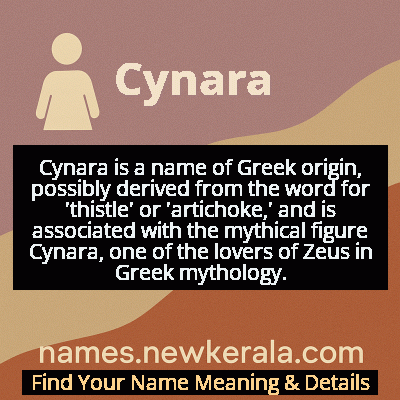Cynara Name Meaning & Details
Origin, Popularity, Numerology Analysis & Name Meaning of Cynara
Discover the origin, meaning, and cultural significance of the name CYNARA. Delve into its historical roots and explore the lasting impact it has had on communities and traditions.
Name
Cynara
Gender
Female
Origin
Greek
Lucky Number
8
Meaning of the Name - Cynara
Cynara is a name of Greek origin, possibly derived from the word for 'thistle' or 'artichoke,' and is associated with the mythical figure Cynara, one of the lovers of Zeus in Greek mythology.
Cynara - Complete Numerology Analysis
Your Numerology Number
Based on Pythagorean Numerology System
Ruling Planet
Saturn
Positive Nature
Ambitious, efficient, realistic, and authoritative.
Negative Traits
Materialistic, stressed, confrontational, and can be overly ambitious.
Lucky Colours
Dark blue, black.
Lucky Days
Saturday.
Lucky Stones
Blue sapphire, amethyst.
Harmony Numbers
2, 4, 6.
Best Suited Professions
Business leaders, managers, financial services, law enforcement.
What People Like About You
Leadership, determination, organizational skills.
Famous People Named Cynara
Cynara Brown
Botanical Illustrator
Created renowned botanical illustrations of Mediterranean flora
Cynara Coomer
Medical Doctor
Chief of Breast Surgery at Northwell Health
Cynara L. Shepherd
Literary Scholar
Published research on mythological names in modern literature
Name Variations & International Equivalents
Click on blue names to explore their detailed meanings. Gray names with will be available soon.
Cultural & Historical Significance
Extended Personality Analysis
People named Cynara typically exhibit personality traits that reflect their mythological and botanical origins. They often possess a protective outer demeanor that shields a more vulnerable, compassionate interior - much like the artichoke's thorny exterior protecting its tender heart. Cynaras are frequently described as intellectually sophisticated, with a natural elegance and deep appreciation for beauty in all forms. Their mythological background suggests individuals who navigate between different worlds or social circles with grace, often serving as bridges between disparate groups. They tend to be resilient and adaptable, capable of transforming difficult circumstances into opportunities for growth. Emotionally, Cynaras are often complex and layered, requiring time and genuine connection to reveal their true depth. They typically value authenticity in relationships and possess strong intuitive abilities that help them understand others' hidden motivations and emotions.
Modern Usage & Popularity
In contemporary naming practices, Cynara maintains a position as an uncommon but culturally rich choice that appeals to parents seeking names with mythological depth and botanical connections. While it has never reached mainstream popularity, it enjoys consistent usage among families with Greek heritage, academic backgrounds, or interests in classical mythology. The name has seen a modest increase in usage in recent years as part of the broader trend toward unique mythological and nature-inspired names. Modern parents are often drawn to Cynara's elegant sound, literary connections, and the positive symbolism associated with artichokes - including hope, protection, and hidden beauty. The name is particularly popular in artistic and intellectual circles, where its classical roots and uniqueness are especially appreciated. Current usage trends suggest Cynara may continue to gain gradual popularity as parents increasingly seek distinctive names with meaningful historical and cultural backgrounds.
Symbolic & Spiritual Meanings
The symbolic meanings of Cynara are deeply layered, drawing from both its mythological origins and botanical associations. Primarily, the name symbolizes transformation and adaptation, reflecting the mythological story of a maiden becoming a plant. The artichoke connection brings additional symbolic weight: its protective thorns represent defense mechanisms and boundaries, while the tender heart symbolizes vulnerability and hidden depth. In broader symbolic terms, Cynara represents the idea that true value and beauty often require patience and effort to discover. The name also carries connotations of Mediterranean elegance, culinary sophistication, and connection to the earth. In psychological symbolism, Cynara suggests complex personalities that balance strength with sensitivity, independence with emotional connection. The literary associations add layers of meaning related to fidelity, memory, and the persistence of emotional bonds across time and change.

